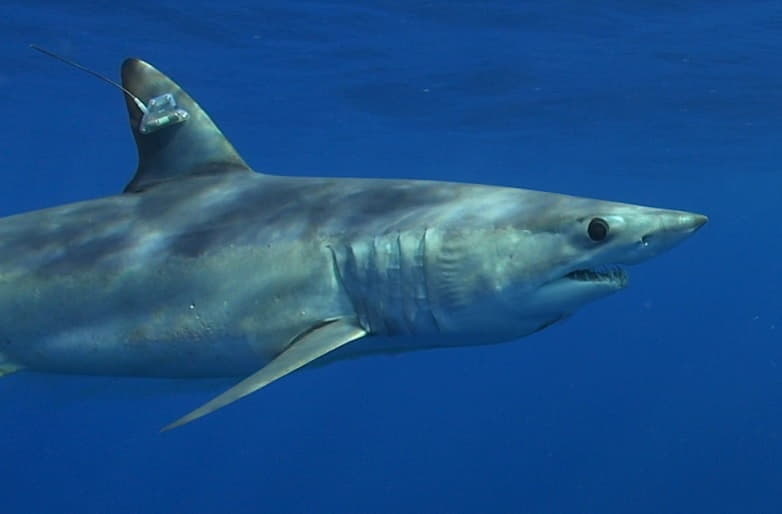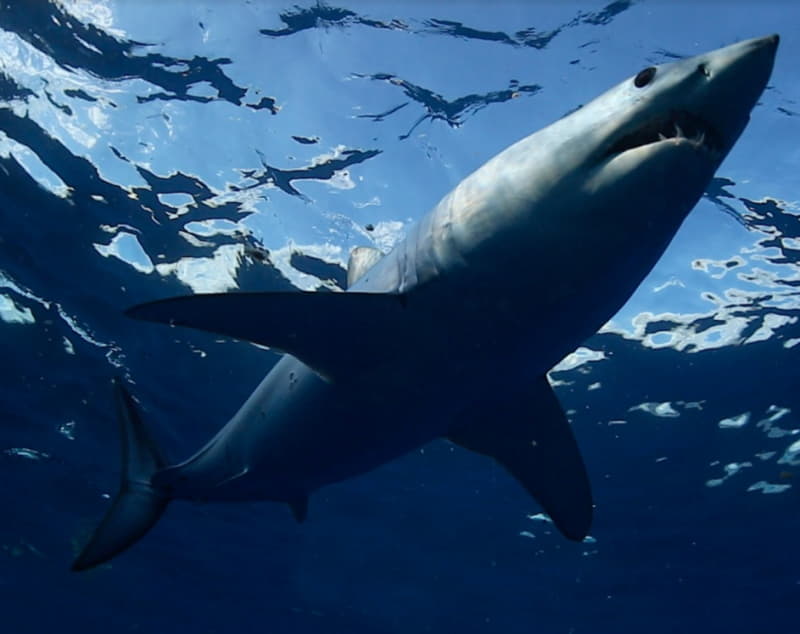Countries unite to protect mako sharks whose population decline was highlighted in Nova Southeastern University’s Guy Harvey Research Institute mako mortality study

Shortfin mako sharks, the fastest sharkin the ocean, scored an international victory when countries voted for a proposal to strengthen the protection of shortfin and longfin mako sharks during a global wildlife conference in August convened by members of the Convention on International Trade in Endangered Species of Wild Fauna and Flora (CITES), the treaty that governs international wildlife trade. Mako sharks had not previously been protected under CITES.
Shortfin makos are captured mainly as bycatch in other offshore fisheries but kept for their high value meat and fins. The biology and migration patternsof this species, also coincidentally the athletics mascot of Nova Southeastern University, is a major topic of study by researchers from the university’s Guy Harvey Research Institute (GHRI). A 2017 collaborative study by the GHRI, the University of Rhode Island and other colleagues highlighted that the fishing mortality rate of shortfin makos in the western North Atlantic was10 times higher than previously estimated from catches reported by fishermen. The new data suggested that this ocean apex predator is experiencing overfishing, raising serious concerns about whether the current levels of fishery catches in the North Atlantic are sustainable.

“The CITES listing is a significant step in helping protect these animals,” said Mahmood Shivji, Ph.D., director of the GHRI and professor at Nova Southeastern University’s (NSU) Halmos College of Natural Sciences and Oceanography. “We’ve been studying mako sharks for many years, and have seen first-hand from our tracking studies the excessive exploitation this species is experiencing in the western North Atlantic Ocean.”
Under the just ratified CITES Appendix II listing, mako shark productscan’t be traded across international borders unless it can be shown by the exporting country that mako fishing isn’t threaten their chances for survival.
“This increased protection for mako sharks is much needed,” said Greg Jacoski, executive director of the Guy Harvey Ocean Foundation, which helped fund NSU’s GHRI study. “Mako sharks are very important, both ecologically and economically, and their population cannot keep up with the current rate of removal.”
The decline of mako populations is traced to overfishing of young makos, which impacts reproductive rates, and from the natural deaths of mature females over the last 30 years. According to the International Commission for the Conservation of Atlantic Tunas shark species group, the mako population would continue to decline until at least 2035, even it fishing of the species ceased immediately.
The closest relative to the great white shark, makos are the cheetahs of the shark species. As the fastest species of sharks, makos can swim up to 60 mph.
About NSU’s Guy Harvey Research Institute: Established in 1999, the Guy Harvey Research Institute (GHRI) is a collaboration between the renowned marine artist, scientist and explorer, Dr. Guy Harvey, and Nova Southeastern University. The mission of NSU’s GHRI is to provide the scientific information necessary to understand, conserve, and effectively manage the world’s marine fishes and their ecosystems. The institute is one of only a handful of private organizations dedicated exclusively to the science-based conservation of marine fish populations and biodiversity. The research, education and outreach activities of NSU’s GHRI are supported by the Guy Harvey Ocean Foundation, AFTCO Inc., extramural research grants, philanthropic donations by private businesses and individuals, and NSU. Please visit http://cnso.nova.edu/ghrifor more information.
About the Guy Harvey Ocean Foundation: The Guy Harvey Ocean Foundation (GHOF) conducts scientific research and hosts educational programs aimed at conserving the marine environment. The GHOF also funds affiliated researchers working to better understand our ocean ecosystem and educators helping to foster the next era of marine conservationists. The GHOF will help ensure that future generations can enjoy and benefit from a properly balanced ocean ecosystem. www.GHOF.org



















